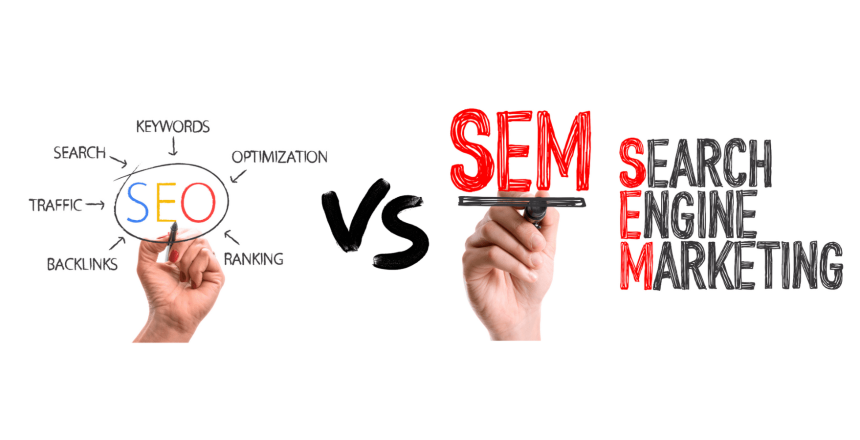Do you want impressive digital results? You have two options, Search Engine Optimisation (SEO) and Search Engine Marketing (SEM). The confusing part is analysing which one serves you better.
With millions of businesses aiming to allure users, you need to optimise your website to augment its growth. Search marketing can be a challenging strategy to embrace if you are unsure of the difference between SEO and SEM.

What is Search Engine Optimisation?
SEO is a digital marketing strategy to increase the quantity and quality of organic search traffic to your website. The objective of SEO is to rank your website at the top in the organic search results.
The SEO strategy concerns organic search traffic. It includes users who click on search results, not sponsored or paid ads. Any unpaid traffic from search engines such as Google is considered organic search traffic.
Google’s search results are segmented into two categories: organic search results and paid search results. SEO concerns ranking only in the organic results. Therefore, traffic quality is a critical element of SEO. After getting high-quality traffic, you need to increase the quantity of incoming traffic.
What is Search Engine Marketing?
Search Engine Marketing (SEM) refers to strategies that help your website get attention on search engine results pages (SERPs). It includes many paid strategies, such as Pay Per Click (PPC) ads that drive traffic to a landing page, to a phone call, or to a lead form.
While SEO focuses entirely on ranking organic results, SEM uses paid ads to get traffic from search engines. You may have heard that SEM is a broader term that includes SEO, and as the two increasingly influence each other, some digital marketers (including us) consider SEM a practice consisting of both organic and paid tactics.
What is the Difference Between SEM and SEO?
Both marketing campaigns have their specifics and fundamentals. The primary difference is that SEO focuses on gaining organic traffic, while SEM is concerned with filling the gaps in your organic rankings – and beating out your competitors – with paid traffic. The strategies are broken down below to better evaluate which options will be the best fit for your organisation.

1. Time to see results
SEM may be a better option if you want quicker clicks and conversions. It gives you instant results as soon as your campaign is live. On the contrary, SEO is a slow burn process. While SEO can start to show results in as little as three months, it can take much longer to see the desired results, particularly for highly competitive terms. That slower time to build those organic rankings does typically also translate into your organic traffic building up and having a snowball effect that lasts for a longer timeframe (though SEO work is never finished with constant algorithm changes and competition). SEM traffic on the other hand will only be coming into your website for as long as your campaign is live and it will need regular monitoring and adjustments.
2. Cost
The best aspect of SEM is setting an allocated budget while taking complete control of it. You only pay for each click you get, and you control the targeting, so you shouldn’t be wasting any money on uninterested audiences. SEO is meant for the longer term and requires more investment. Although SEO may be more effective, you will need to be prepared to allocate a long-term budget for this marketing strategy.
Arguably, both strategies are the same in this respect. SEO will need a long-term investment to generate a return, but your paid ads will simply stop if you turn the budget off, so a long-term investment should be considered applicable to both approaches.
3. Testing and Targeting
SEM makes monitoring your performance and achieving the desired objectives relatively easy. SEO often means you have to check longer-term results. Using SEO, it can take longer to see what impact changes make to your campaign, and what things are working or not working. Therefore, problem-solving your SEO can also be a long, slow process. This is where the overlap between SEO and SEM can really help as paid ads will enable you to quickly test certain keywords, promotional text, and landing pages before investing the time and money into SEO for those same items.
As far as targeting is concerned, you can target your audience quite specifically through PPC campaigns. On the other hand, SEO is at the mercy of what search engines believe the intent of your page is, combined with how relevant that is to the intent of any given search terms. This is another area of overlap that can help you to get more value from both SEO and SEM campaigns. SEO can bring in traffic and when users take actions that demonstrate an interest, they can be retargeted with your paid ads.

4. Sustainability
To remain sustainable, both SEO and SEM strategies need to be refreshed and updated constantly to cater to changing algorithm updates, competitor behaviours, and search trends. Keywords trend up and down all the time, and what is working one week may not be working another week.
This is a natural occurrence not dissimilar to seasonal change and event-driven fluctuations. Social media can have a big impact on this too as influencers popularise different words, phrases, products and services.
No marketing campaign is set and forget, SEO and SEM should always be constantly monitored and adjusted.
Using SEM and SEO together
Using both marketing strategies simultaneously can improve your website’s ranking on the SERP results. Upon integrating both strategies correctly, the two complement each other well. We’ve already touched on a few points of overlap, here are a few more ways you can use both approaches together:
Achieving Instant and Sustainable Results
SEM is the best option if you want to get rapid results. SEO takes more time, but the results are more sustainable. You can implement both these strategies to gain quick results and long-term effects that are influenced by what is working in those paid ad campaigns.
In the initial stages, you can use SEM to drive traffic to your website. Once the foundation is built, you can utilise SEO for long-term results and dominate both paid and organic placements for your desired terms and use SEM as a means to fill any gaps or target new keywords that your website doesn’t yet rank for organically.
SEM as keyword research for SEO
SEM’s speed makes it an outstanding tool for testing keywords and keyword planning tools provide brilliant data on search volumes and competition levels for different terms. You can use what is working for you in paid ads to inform your SEO. Terms that are expensive, but desirable in your paid ads might be ones you choose to focus your SEO efforts on. Or perhaps you take a different approach, use the paid ads to target the mid-range competition keywords and focus your SEO on all the low-competition terms. Pick up that low-hanging fruit so to speak.

SEM can be used for testing web content
You can use SEM as a testing ground for your website’s content and then apply the learnings to your website.
For instance, before you update the headline, you can see what text drives optimum engagement rates. You can test different ad copy variations and observe which gets the best click-through rates.
When you create landing pages, it requires a significant part of your investment. Therefore, you should test out headlines, messages, CTAs, etc. This ensures your investment is generating the best results for you.
Reduce SEM keyword bids
Every penny counts in your paid search ads. Using SEO and SEM together will ensure that no budget goes to waste.
SEM can display your ads with a maximum cost-per-click defined, but it can also be setup to show for keywords with a high cost-per-click (CPC) if the search engine knows those terms will also get you a better conversion rate than lower cost terms. Your SEO can help to inform this. Just as you are learning from both strategies, search engines are learning about your website as well.
Combining insights from the two channels allows you to avoid spending in areas where SEM has a low conversion rate, even if the cost-per-click is low. In the same way, search engines learn from user behaviours on your organic search results and these learnings help them to identify the best value targets from your paid ads.
You can use the learnings in reverse yourself to increase focus on organic optimisation for keywords that are getting you the best value.
The Bottom Line
So, is SEO more important than SEM? To have a robust online presence and marketing strategies, you should incorporate both SEM and SEO. Both are equally important and work together for your organisation.
Acquiring traffic from search engines can be a daunting experience. There is so much going on between these two approaches, and a lot of jargon as well. As a full-service marketing agency, we do recommend that if you don’t have the right people on your team, you choose to work with an outsourced agency that knows what they are doing and can help you to make the most of your limited online marketing budget.
The right team will help you to craft a strategy that includes SEO and SEM in a way that leverages the strengths of both to optimise your website results from both approaches and feeds into your email marketing automation strategies and social strategies as well. At the end of the day, they all work together.
As we become more reliant on technology, making the most effective use of all of the marketing platforms and strategies that are available to your business will be crucial in the future digital marketplace. You don’t need to use every tool available, just the ones that are the best fit for your business.
Don't have the time or the skills to manage your SEO & SEM? Dovetail Group can help. Start a conversation.
At Dovetail Group, we provide simple, yet effective revenue growth services and solutions to make everything work well. We have achieved excellent statistics for our clients and saved them thousands of dollars.
Interested in learning more? Start a Conversation.


